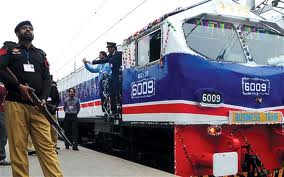
Lahore, Feb 4: A security guard pointing a gun at your chest may not be a perk of first-class travel in the West, but it’s all part of the service on Pakistan’s gleaming Business Express.
Thirteen carriages have been lovingly restored into a sleek sleeper to ply the 1,200 kilometres between Pakistan’s two biggest cities, Lahore and Karachi, on an 18-hour journey that once used to take upwards of 30 hours.
Presided over Friday by Prime Minister Yousuf Raza Gilani, perhaps keen to front a good-news story as he faces contempt charges, and waved off by excited crowds it is Pakistan’s most luxurious and expensive train.
For 5,000 rupees one way, or 9,000 rupees return, passengers are waited on by a bevy of attentive stewards, as they settle down to watch films on flat-screen TVs or power up laptops.
Afternoon tea and piping hot dinner — courtesy of chefs at five-star hotels are borne into cabins as uniformed guards carrying rifles in the corridors are a reminder of a country troubled by kidnappings, Taliban and Al-Qaeda violence.
Then as night falls, stewards come round with crisp bed linen to turn slightly hard green bunks into inviting beds.
It’s all part of a first private investment of millions of rupees in the ailing state railways, billed as the last hope of preventing a much-loved relic of British rule from falling into ruin.
Corruption, mismanagement and neglect have driven Pakistan Railways to the brink.
Since Gilani’s government took power in 2008, the group has retired 104 of 204 trains in a country larger than Britain and Germany combined.
It relies on handouts of $2.8 million a month just to pay salaries and pensions, and faces expected losses of $390 million in the current fiscal year.
But the new train pulled away five minutes early and customers boarded from a brand-new business lounge at Lahore station. Decorated in tinsel, the engine then ground to a halt 10 minutes later to pick up more passengers.
Mariyam Imran, a strikingly beautiful young advisor for cosmetics firm L’Oreal, is delighted. A frequent traveller and terrified by a recent emergency landing on increasingly precarious state airline PIA, she is an avid convert.
“It’s beautiful. It’s relaxing, compared to the trains before. I’m so happy and very comfortable. The staff are good. It’s a marvellous train,” the 22-year-old young mother told AFP.
Travelling with her businessman husband, three-year-old daughter and sister-in-law they are heading to Karachi for a short break before returning to host a Valentine’s Day party at home in Lahore on February 14.
“I hate PIA. Oh my God, that emergency landing. Compared to the plane, this train is best. The service is very good.”
Gilani congratulated staff on what he called a “deluxe” and “state of the art” service that would serve as a trail blazer for future private-public partnerships capable of turning around Pakistan’s depressed economy.
“It’s a big, big initiative from the private sector, which we have welcomed with open arms,” Arif Azim, the chairman of Pakistan Railways, told AFP.
Years of decline saw customers flock to airlines and luxury coaches.
Azim hopes that if the Business Express, and a similar service to be rolled out on February 20 between Lahore, the textiles centre of Faisalabad and Karachi, are a success then investors will sink millions more into saving the railways.
“The sky’s the limit because we’re in a pretty bad shape. We need a totally new fleet. Seventy-five per cent of our wagons can be described as vintage,” he said.
Retired journalist Ishtiaq Ali is taking his young, second wife home after a two-week holiday to show her snow for the first time in Murree, a resort in Pakistan’s foot hills of the Himalayas.
“Oh my goodness, what the hell are you talking about,” he jokes when asked how the new train compares to the best rail services in the West.
“It’s impossible. There’s no education, there’s no security, there’s no insurance. In Pakistan, you can go outside and you can be held at gunpoint.”
It may not be a bullet train. It may not be the Orient Express, but his young wife smiles as she edges out of Lahore, speeding past clapped-out carriages shunted onto sidings.
